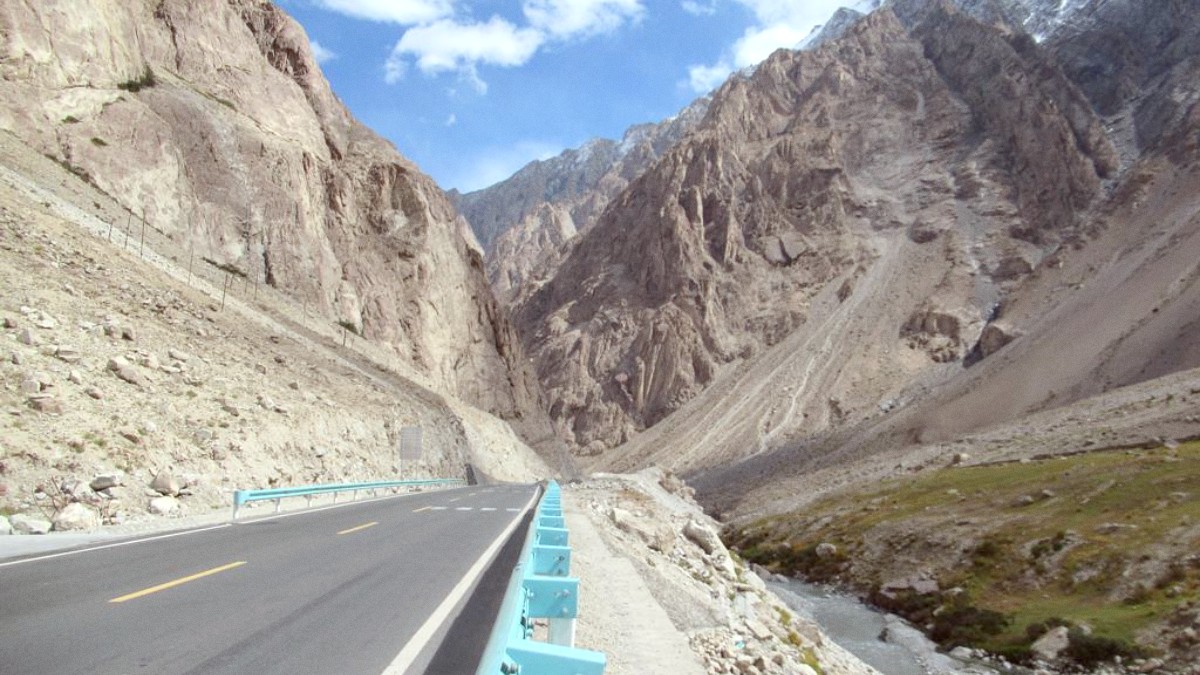
Pakistan
The Karakoram Highway is a marvel of engineering, stretching over 1,300 kilometers (around 800 miles) from Hasan Abdal in Pakistan's Punjab province to the Khunjerab Pass, located high on the border with China. This highway cuts through three of the world's most impressive mountain ranges: the Himalayas, the Karakoram, and the Hindu Kush. These ranges meet near Jaglot, a place offering a rare geographical spectacle.
The Karakoram Highway has a deep history, built upon ancient routes that once connected East and West. It traces the footsteps of the Silk Road, the network of trade routes that facilitated the exchange of goods, ideas, and cultures between China, Central Asia, and the Indian subcontinent for centuries.
Construction of the modern Karakoram Highway began in 1966, a joint effort between Pakistan and China. It took nearly two decades to complete, involving immense effort and sacrifice. Thousands of workers from both countries labored in dangerous conditions, blasting through mountainsides and building bridges over roaring rivers. The project became a symbol of friendship and cooperation between the two nations, often called the "Eighth Wonder of the World" for its engineering feats in such challenging terrain.
A trip along the Karakoram Highway offers a mix of adventure, natural beauty, and cultural discovery. Expect days filled with dramatic mountain views, from the snow-clad giants of the Karakoram range to the deep valleys carved by ancient rivers. You will encounter various landscapes, including lush green valleys, arid plateaus, and glaciated peaks. The journey itself is a major part of the experience, with winding roads and numerous viewpoints.
Culturally, the KKH connects several distinct communities. In Hunza Valley, you discover the gentle traditions of the Ismaili people, visit historic forts like Baltit and Altit, and learn about local customs. Further north, towards Khunjerab Pass, you encounter the Wakhi culture. Throughout Gilgit-Baltistan, you find hospitality. Local food, simple but hearty, mirrors the mountain environment.
Dramatic mountain vistas and diverse landscapes.
Discover Ismaili and Wakhi traditions.
Walks, treks, boat rides on Attabad Lake.
Chance to see Marco Polo sheep in Khunjerab National Park.
Road conditions can change quickly; flexibility is important.
Activities vary from easy walks through terraced fields to challenging multi-day treks into high mountain wilderness. You can take boat rides on the striking turquoise waters of Attabad Lake, explore bustling local bazaars in Gilgit and Karimabad, or simply relax and absorb the views from a guesthouse terrace.
Wildlife spotting, especially in Khunjerab National Park, grants chances to see rare species like Marco Polo sheep. This destination is for those seeking a profound connection with nature.
The KKH offers a glimpse into resilient mountain communities. It is a truly rewarding journey.
Plan your journey with flexibility. Road conditions can change quickly due to weather or landslides, causing delays.
The Karakoram Highway region has distinct seasons, each offering different advantages and challenges. Careful planning ensures a pleasant experience.
For a rewarding Karakoram Highway trip, prioritizing health and safety is important. This region, while generally safe for tourists, presents unique environmental and logistical considerations.
June to September for clear roads and trekking.
Most nationalities use e-Visa; no NOC generally needed for KKH.
PKR is currency; expect good value for money.
Health and safety considerations are important for a rewarding Karakoram Highway trip. This region, while generally safe for tourists, presents unique environmental and logistical considerations.
Temperatures vary with altitude and time of day. Moisture-wicking and waterproof outerwear are important.
Passport, visa, insurance, and copies are needed. Keep them organized.
Power adapter, portable chargers, and offline maps are good companions.
Comfortable daypack, trekking poles, water reservoir.
Lightweight tent, appropriate sleeping bag, sleeping pad.
DSLR/mirrorless camera, extra batteries, dust protection.